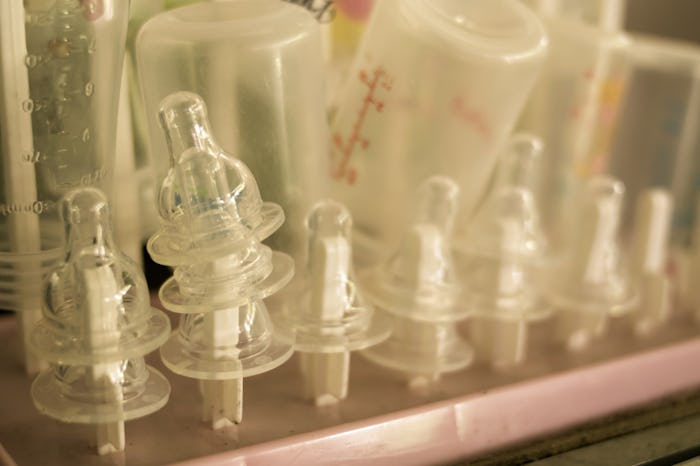Life

Here's How Often You *Actually* Need To Sterilize Your Baby's Bottles
With two bottle-fed kids, I really try hard not to think about how much time I've spent washing and sterilizing bottles over the last several years. But if I have to think about it, well, spoiler alert: it's a lot. It wasn't long after bringing my daughter home from the hospital that I started to wonder, do you need to sterilize bottles every time you use them? And of course, that internal question was quickly followed by a silent wish. OMG I hope not.
Thankfully, and according to Parents, you do not need to sterilize bottles every time you use them. There are, however, a few instances in which a quick wash or scrub just won't do. tThe experts at Parents suggest sterilizing bottles before you first use them, then occasionally after that initial feeding. You should definitely sterilize bottles after your baby has been sick, if only to eradicate any lingering germs.
Most experts suggest sanitizing your bottles once a week until your baby turns 1-year-old. Parents Guide takes a step further and describes the reason behind the cut off, writing:
"It is widely recommended that you continue to sterilize your baby’s bottles until the age of 1. After the age of 1 your little baby’s immune system should have developed providing a much higher tolerance to germs. Many mothers recommend sterilizing your baby’s nipples and dummies until your little one stops using them."
While you don't need to sterilize your baby's bottles after each use, you do need to make sure they are thoroughly cleaned post-feeding and before another bottle-feeding. That means, according to Parents, you either need to clean baby bottles by hand with hot, soapy water, or run them through a dishwasher cycle set on "hot" or "sanitize."
You'll want to sterilize your bottles regularly to ensure they aren't growing any bacteria that could cause your baby to get sick. Likewise, if your baby has been sick, you want to sterilize bottles to ensure your baby doesn't get reinfected by his or her own germs. After all, sterilizing bottles is a great way to protect against a repeat sickness, and there's nothing worse than a sick baby when you're a sleep-deprived new parent.
Sterilizing bottles isn't very hard, but it does take a little time depending on the method you use. You can use an electric bottle steamer, a microwave bottle steamer, or you can do it the old fashioned way by boiling baby bottles on the stove. With an electric steamer, you plug it in and go. With a microwave steamer, you load it up and stick it in a clean microwave. You can also use the microwave without a microwave steamer by placing clean bottles half-full with water in the microwave for 90 seconds, according to Parent Guide. For the nipples and rings, place them in a microwave-safe dish with enough water to cover them and microwave for 90 seconds.
If you're going the minimalist route, boiling baby bottles doesn't require any more equipment than what you probably have in your kitchen. You'll need a big pot or pan that can fit a few bottles or more at a time. Before you start sterilizing your bottles, make sure the pot is scrubbed clean if you regularly use it to cook food. Then, according to Parent Guide, you simply place your bottles and bottle parts in the pan and cover it with water. Bring the pot of water and bottles to a boil on the stove and boil continuously for five minutes. Then let the water cool down before removing the bottles.
One thing to consider when investing in bottles is that you'll want to look for BPA-free bottles, because no matter how you sterilize your bottles, the method will inevitably use heat to kill germs and bacteria. Parent Guide explains, "Plastics can contain BPA and other nasty chemicals that when heated, leech through your babies formula or milk." Not something you want in your baby's food, to be certain.
Check out Romper's new video series, Romper's Doula Diaries:
Watch full episodes of Romper's Doula Diaries on Facebook Watch.